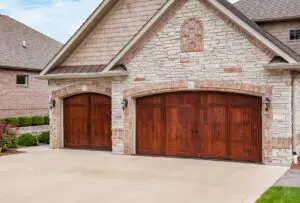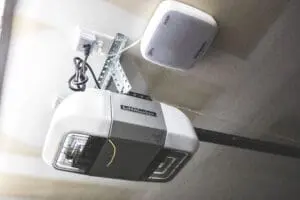
How Much Does Garage Door Repair Cost in 2025?
Tired of holding the garage door button just to get it to open or close? Learn the common causes, easy DIY fixes, and when to call Welborn Garage for expert help.
We’ve all been there. You’re coming home after a long day, hit the garage door opener, and suddenly your garage door sounds like it’s about to fall apart.
While it might seem like just a harmless annoyance, those strange noises can actually be red flags for bigger problems brewing under the surface.
So, let’s talk about it. Why is your garage door making noise? And more importantly, what can you do about it before a small issue turns into a big (and costly) one?
At Welborn Garage, we’ve heard it all. From squeaks and screeches to clunks and bangs, every noise tells a story—and we’re here to help you decode it.
Believe it or not, garage doors aren’t supposed to be completely silent. You’re still moving a 100- to 500-pound slab of metal, wood, or glass. So a little low hum or quiet motor noise is normal. But:
If your garage door has gone from background noise to front-and-center drama, it’s time to investigate.
Let’s break down the most common garage door sounds and what they typically mean. You might be surprised how much you can learn from a little noise.
What it sounds like: Metal-on-metal or like your garage door is chewing on something.
What it could be:
Why it matters:
Over time, loose parts can damage the system further. Worn rollers can cause the door to shake, and damaged tracks can lead to the door getting stuck—or worse, derailing.
What it sounds like: High-pitched, like an old swing set.
What it could be:
Why it matters:
Friction puts stress on moving parts. If you catch this early, a little garage door lubricant might fix it. If not, those dry parts can wear out and need replacing.
What it sounds like: A loud thud when the door closes.
What it could be:
Why it matters:
This is a safety concern. If your springs or cables are failing, your garage door could slam shut unexpectedly. Don’t try to fix this one yourself—springs are under high tension and can be dangerous.
What it sounds like: Light metal-on-metal tapping, usually when the door moves.
What it could be:
Why it matters:
This may not seem like a big deal, but these issues affect the door’s ability to run smoothly and safely. If your sensors are out of line, your door could stop mid-close or fail to reverse when something is in the way.
We’re not saying you need to become a garage door technician overnight. But there are a few simple things you can safely check if your door is acting up:
Use a silicone-based garage door lubricant (not WD-40) on:
If the squeaking stops—great! Just remember to do this every six months.
Use a wrench to gently tighten loose nuts and bolts on the tracks and brackets. Don’t over-tighten—just snug them up.
If your rollers are cracked, chipped, or have flat spots, it’s time to replace them. Nylon rollers are quieter than steel ones and don’t need as much lubrication.
Pull the emergency release cord and try lifting the door by hand. If it feels heavy or doesn’t stay open on its own, your springs might be worn. Time to call in the pros.
If the noise doesn’t go away after those simple checks—or if your garage door is still acting like it belongs in a horror movie—it’s time to call in the experts.
Here’s what you get when you call Welborn:
We’ll inspect your entire system, find the issue, and get your door back to quiet operation fast.
We get it. Life gets busy. But putting off garage door repairs is like ignoring a weird sound in your car—it won’t get better on its own.
Here’s why you shouldn’t wait:
Plus, a well-functioning door keeps your garage secure, protects your car, and doesn’t make your house sound like a construction site every morning.
If your garage door is just plain loud—even when it’s working properly—there are upgrades that can help:
Our team can walk you through all of it.
Let’s clear up a few things:
“It’s always been noisy—it’s fine.”
Not true. Doors get noisier as parts wear out. That sound is trying to tell you something.
“I can just spray it with WD-40.”
Please don’t. WD-40 is a solvent, not a lubricant. It can dry out parts and make things worse.
“Garage door repairs are expensive, so I’ll wait.”
Actually, early repairs are way cheaper than waiting for something to break completely.
Welborn Garage has helped hundreds of thousands of homeowners across DFW keep their garage doors running smoothly—and quietly. With nearly 30 years of experience and 5-star ratings, we’re proud to be the go-to name for garage door repairs, maintenance, and upgrades.
If your garage door is trying to speak to you in groans, rattles, or screeches, it’s time to listen. Let the team at Welborn Garage help you fix the issue before it becomes a bigger problem. Ask about our garage door quieting Welborn Whisper service.
Call now or schedule online for fast, friendly, and reliable service across the Dallas-Fort Worth metroplex.

Don't let your garage project, just be a project. Schedule today, and make your garage the centerpiece of your home!

Tired of holding the garage door button just to get it to open or close? Learn the common causes, easy DIY fixes, and when to call Welborn Garage for expert help.

Tired of holding the garage door button just to get it to open or close? Learn the common causes, easy DIY fixes, and when to call Welborn Garage for expert help.

Tired of holding the garage door button just to get it to open or close? Learn the common causes, easy DIY fixes, and when to call Welborn Garage for expert help.